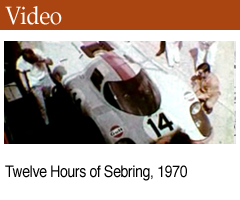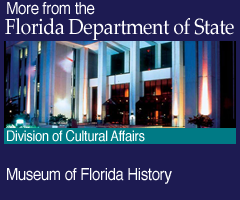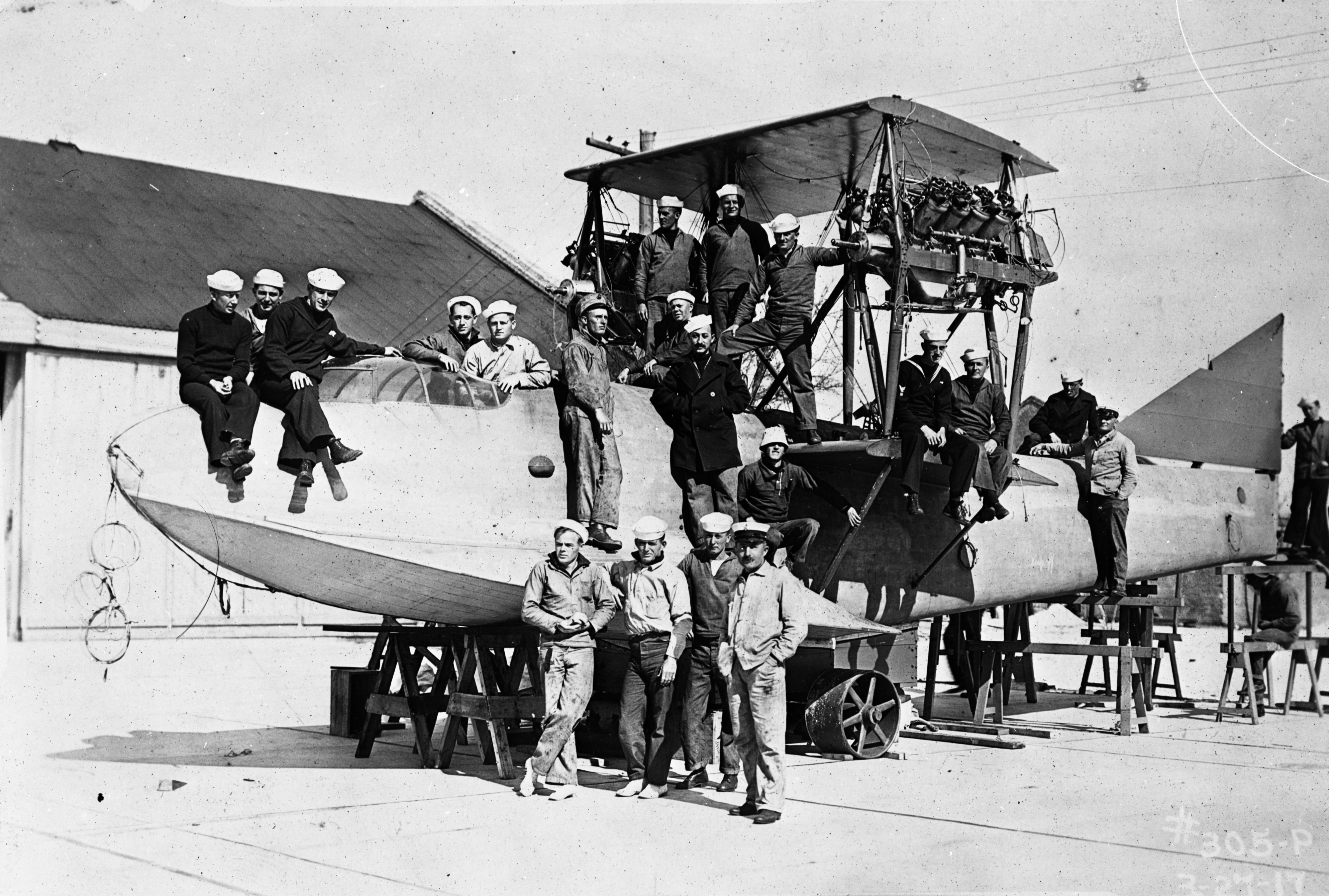Early Auto Registrations, 1905-1917
Early Auto Laws
The following law, signed by Governor Napoleon Bonaparte Broward on May 11, 1905, established the Florida Department of State's authority to register motor vehicles in the State of Florida:
CHAPTER 5437 (No. 66.)
AN ACT Regulating the Running of Automobile & or Motor Vehicles on the Public Roads or Highways in the State of Florida.
Be it Enacted by the Legislature of the State of Florida:
Section 1. All persons owning or operating vehicles propelled by any power other than muscular power, excepting such motor vehicles as run only upon rails or tracks, shall file with the Secretary of State of the State of Florida, the name of owner, with a brief description of the motor vehicle, including the horse power and make of such "Motor Vehicle" on a blank form to be furnished by the Secretary of State for identification. The filing or registration fee shall be two dollars.
Sec. 2. The Secretary of State shall thereupon enter of record in a book to be kept by him for that purpose, the name of the owner, the number and kind of motor vehicle registered, and shall issue to the owner or operator thereof a certificate of registration.
Sec. 3. Every such registered motor vehicle shall while in use on a public road or highway, be provided by the owner with a suitable bell, horn or whistle to be used u a signal. They shall likewise, be provided with two lamps which shall be lighted between sunset and sunrise when in use on the public highways of the State. Every such motor vehicle shall also have displayed on the back of such vehicle in such manner as to be plainly visible, numbers to be in Arabic numerals of not less than three inches long and two inches wide, and the owner or person operating such vehicle shall at all times when using the same, carry with them the certificate of registration or permit issued by the Secretary of State.
Sec. 4. In case of sale or exchange of registered motor vehicles, the person becoming owner thereof shall have such transfer entered on the records of the Secretary of State, and shall pay a fee of two dollars therefor.
Sec. 5. Any person failing to comply with sections 1 2, 3 and 4 of this Act shall be guilty of a misdemeanor and upon conviction be fined not exceeding one hundred dollars.
Sec. 6. No person shall operate any such registered vehicle on a public highway at a rate of speed greater than is proper or reasonable, having due regard to the traffic and use of the highway, or so as to endanger the life or limb of any person, or the safety of any property.
Sec. 7. Upon approaching any sharp curve, bridges, fills and intersections of, or crossings of other roads, the person operating a motor vehicle required to be registered shall not run the same at a rate of speed exceeding four miles per hour, and shall at all times while on the public highways have said motor vehicle under perfect control.
Sec. 8. Upon approaching a person walking in the roadway of a public highway, or a horse or horses, or other draft animal , being ridden, led or driven thereon, a person operating any such registered motor vehicle shall give ample signal or warning of its approach, and use every reasonable precaution to ensure the safety of such person or animal, and, in case of horses or other draft animals, to prevent frightening the same.
Sec. 9. Any person operating any such registered motor vehicle shall, at request or on signal by putting up the hand, from a person riding, leading or driving a restive horse or horses or other draft animals, bring such motor vehicle immediately to a stop, and if traveling in the opposite direction. remain stationary so long as may be reasonable to allow such horse or animal to pass, and, if traveling in the same direction, use reasonable caution in thereafter passing such horse or animal: provided that, in case such horse or animal appears badly frightened or the person operating such motor vehicle is requested so to do, such person shall cause the motor of such vehicle to cease running so long as shall be reasonably necessary to prevent accident and insure the safety of others.
Sec. 10. In case of accident to a person or property on the public highways, due to the operation thereon of any such registered motor vehicle, the person operating such vehicle shall stop, and, upon request of a person injured, or any person present, give such person his name and address, and if not the owner, the name and address of such owner.
Sec. 11. Boards of County Commissioners may, notwithstanding the other provisions of this Act, upon application by reputable citizens, set aside for a given time a apeci1led public highway for speed tests or races, to be conducted under proper restrictions for the safety of the public.
Sec. 12. Every person hereafter desiring to operate any such registered motor vehicle as a chauffeur shall file in the office of the Secretary of State, on a blank to be supplied by such secretary, a statement which shall include his name and address and the trade name and motive power of the motor vehicle he is able to operate, and shall pay a registration fee of two dollars. The Secretary of State shall thereupon file such statement in his office, register such chauffeur in a book to be kept by him for that purpose, and assign him a number.
Sec. 13. No person shall operate a motor vehicle required to be registered upon the public highways after sixty days after this act takes effect, unless such person can produce a certificate or registration Issued by the Secretary of State, and shall have complied in all respects with the requirements of this Act.
Sec. 14. Nothing in this Act shall be construed to curtail or abridge the right of any person to prosecute a civil action for damages by reason of injuries to person or property resulting from careless or negligent use of the public highways by a motor vehicle or its owner or employee or agent.
Sec. 15. Penalties for excessive speed, et cetera.-The violation of any of the provisions of sections 6, 7, 8, 9, and 10 of this act shall be deemed a misdemeanor, punishable by a fine not exceeding one hundred dollars for the first offense, and punishable by a fine of not less than fifty dollars nor more than one hundred dollars, or imprisonment not exceeding thirty days, or both, for a second offense, and punishable by a tine of not less than one hundred dollars nor more than two hundred and fifty dollars and imprisonment not exceeding sixty days for a third or subsequent offense.
Sec. 16. Penalties for other violations.-The violation of any other section of this act shall be punished by a fine not exceeding 'twenty-five dollars for the first offense, a fine not less than twenty-five dollars nor more than fifty dollars for a second offense, and a fine not less than fifty dollars nor more than one hundred dollars, or imprisonment not exceeding ten days, or both, for a third or subsequent offense.
Sec. 17. In case the owner or person operating a motor vehicle shall be taken into custody because of a violation of any provision of this act, he shall be forthwith taken before an accessible justice of the peace or County Judge, and be entitled to immediate hearing; and if such hearing cannot then be had, be released from custody on giving a good and sufficient bond to appear and answer for such violation, at such time and place as shall then be designated, secured by the sum equal to the maximum fine for the offense with which he is charged, or in lieu thereof, by leaving the motor vehicle, being operated by such person, with such officer as may have the accused person in charge.
Sec. 18. All acts and parts of acts inconsistent herewith or contrary hereto are, so far as they are inconsistent or contrary, hereby repealed.
Sec. 19. All moneys accruing from the fees of this act. shall go into the General Revenue fund of the State.
Sec. 20. Owners of automobiles who have paid a license in any other State shall upon exhibition of such license be exempt from paying a license in this State, for thirty days after said automobiles have been brought into this State.
Approved May 11, 1905.

 Listen: The Bluegrass & Old-Time Program
Listen: The Bluegrass & Old-Time Program


